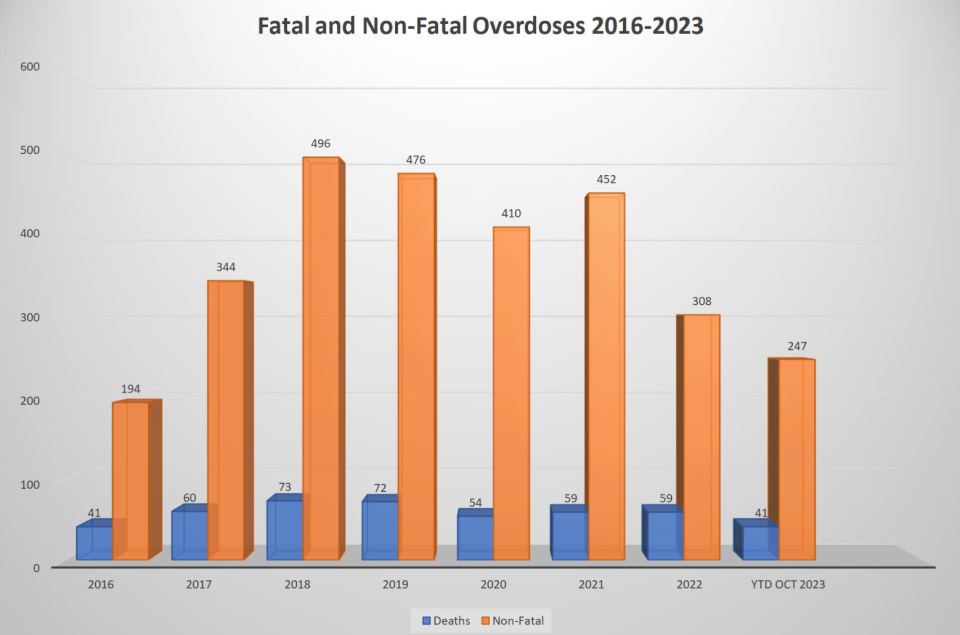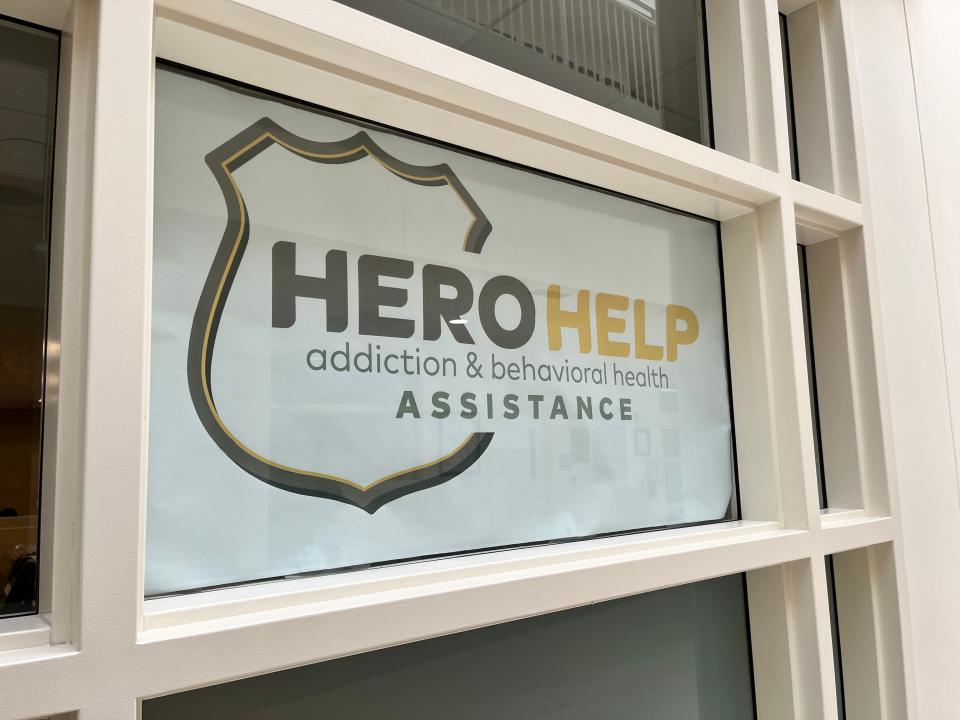After 4 fatal overdoses in 2 weeks, county police focus on helping those with addiction
The first call came in a little before 7 a.m. on Oct. 20.
A 33-year-old man was in the bedroom of his Newark-area home. It was clear to the New Castle County Police officers who arrived on scene soon after the 911 dispatch how he’d died.
The next call was made from Bear at 4:25 a.m. on a Friday in early November.
Like the first man, this 37-year-old was also in a bedroom. Just as they had two weeks prior, county police recognized what had killed him.
Over the next 42 hours, two more calls would come in – one about a 46-year-old man who was found in the bathroom of his home near Newark and the other regarding a 33-year-old man located on the second floor of his Wilmington-area residence.
These men were fathers, brothers, sons and friends. They loved acoustic guitar and Tenacious D. At least one was religious and had known profound loss.
They also all died of opioid overdoses.
For each of these deaths – a relatively large number for a two-week period, New Castle County Police said – others were revived. And with the holidays approaching, first responders in Delaware and across the country are only gearing up for more calls like these.
As recovery groups and nonprofits that raise awareness about addiction step up their outreach during the most festive time of year – which is also the deadliest time of year for drug and alcohol poisonings – New Castle County Police, too, are emphasizing that the department can help.
Years ago, the agency recognized that substance use disorder “was a problem that arresting our way out of wasn't going to be the solution to,” said Mark Grajewski, a former county police drug investigator who has since retired.
From this, the Hero Help program, for which Grajewski serves as coordinator, was born.
'TRANQ DOPE' AND FENTANYL: He almost lost his arms to addiction. But Christiana Hospital did more than save his limbs
Now in its eighth year, the goal is to get those battling addiction the treatment they need while also breaking the stigma surrounding the disease.
Yet police also recognize that not everyone is ready to accept treatment. They’re here for those men, women and teens, too.
“The goal is to keep that person alive as long as we can until they're ready to make that decision,” Grajewski said.
The second responders
On a recent Wednesday, the New Castle County 911 dispatch radio crackled multiple times, alerting first responders to several separate overdoses.
In one call, a man had been revived after a single dose of Narcan, the dispatcher relayed.
Hours later, the outcome for someone found unconscious by a basketball court was less clear.
“Four Narcans were used,” a dispatcher said. The call was marked “closed” five minutes later.
Though all county paramedics and the majority of New Castle County Police officers carry naloxone – the generic name for the opioid-reversing drug Narcan – the job of those within the department’s behavioral health unit, and specifically those who work in the Hero Help unit, extends beyond the urgent life-saving measures needed immediately after someone overdoses.

These men and women are the second responders of sorts, the ones who follow up after a nonfatal drug poisoning.
Within 48 hours of an overdose, a clinician with ChristianaCare and an officer within the unit try to make contact with the user. Delaware’s largest healthcare system began partnering with county police in 2020 and now staffs five positions.
FINAL DAYS OF DEL. ART EXHIBIT: They were parents, friends and colleagues. This gallery shows them beyond their addiction
If the duo is unsuccessful at reaching a patient the first time, they’ll make at least two additional attempts. The goal is to get users into long-term treatment, meaning more than just detox or a 30-day drug rehabilitation facility.
Still, the program is completely voluntary. Police cannot, nor do they want to, force anyone to make a change.
'Enough kids have died'
It’s not just those who overdose who are aided.
Hero Help was initially created as an alternative to arrest for minor crimes related to drug use, such as shoplifting or possession of drug paraphernalia. This gives officers the ability to say, “If you want help, sign this contract and we will either hold off or we won’t charge you if we get you into long-term treatment,” Grajewski said.
Long-term treatment means a minimum of six months, though Grajewski said those in the unit are now realizing that “that’s just touching the surface.”
The program, which is free, is also available to those who have had no police contact at all.
Since its inception in 2016, 674 people have come through Hero Help with a combined 1,773 “treatment episodes,” or times participants have entered treatment.
“We don't fault somebody for – and we expect a person to – have faltering episodes,” Grajewski said. “So we will re-engage them, and it's also a way to open up the conversation about (addiction).”

That conversation is as much for officers as it is for the public.
While attitudes toward addiction are slowly changing nationwide, many still don’t view substance use disorder as a disease. (But in fact, it’s a chronic, relapsing and remitting disease just like any other chronic ailment).
Those in the unit are working to change that.
By participating in community outreach events and even just engaging the families of those struggling with addiction – including by implementing harm-reduction measures such as distributing naloxone or fentanyl test strips – these men and women are shedding light on the complexities of the disease.
RELATED: 'Beats living on the streets:' The Delawareans who call motels home during the holidays
The hope is that in turn, this education will bring understanding, acceptance and empathy.
“Enough kids have died hidden in a basement or a bathroom trying to hide it,” Grajewski said. “If they came out and talked about it, maybe we could get them some help.”
Resources
For more information about Hero Help, visit herohelpbhu.com.
To reach a member of the unit or to request naloxone, dial 302-395-2811. Someone is on call 24/7.
To reach New Castle County Police’s Behavioral Health Unit, call 302-395-2855. This is not a 24-hour line.
atTAcK addiction also recently opened a storefront at 210 Peoples Plaza, Glasgow, DE 19702. It provides information, referrals and resources for substance use disorder, harm-reduction services, housing supports, referrals and more. The store can be reached at (302) 365-5221.
Delaware Hope Line: 833-9-HOPEDE for free 24/7 counseling, coaching and support, as well as links to mental health, addiction and crisis services. Resources can also be found on the Help is Here website.
Suicide and Crisis Lifeline: 988
SAMHSA National Helpline: 800-662-HELP (4357) for free 24/7 substance abuse disorder treatment referral services. Treatment service locators are also available online at findtreatment.samhsa.gov or via text message by sending your ZIP code to 435748.
Got a tip? Send to Isabel Hughes at ihughes@delawareonline.com or 302-324-2785. For all things breaking news, follow her on X at @izzihughes_
This article originally appeared on Delaware News Journal: How this New Castle County Police unit works to fight addiction

